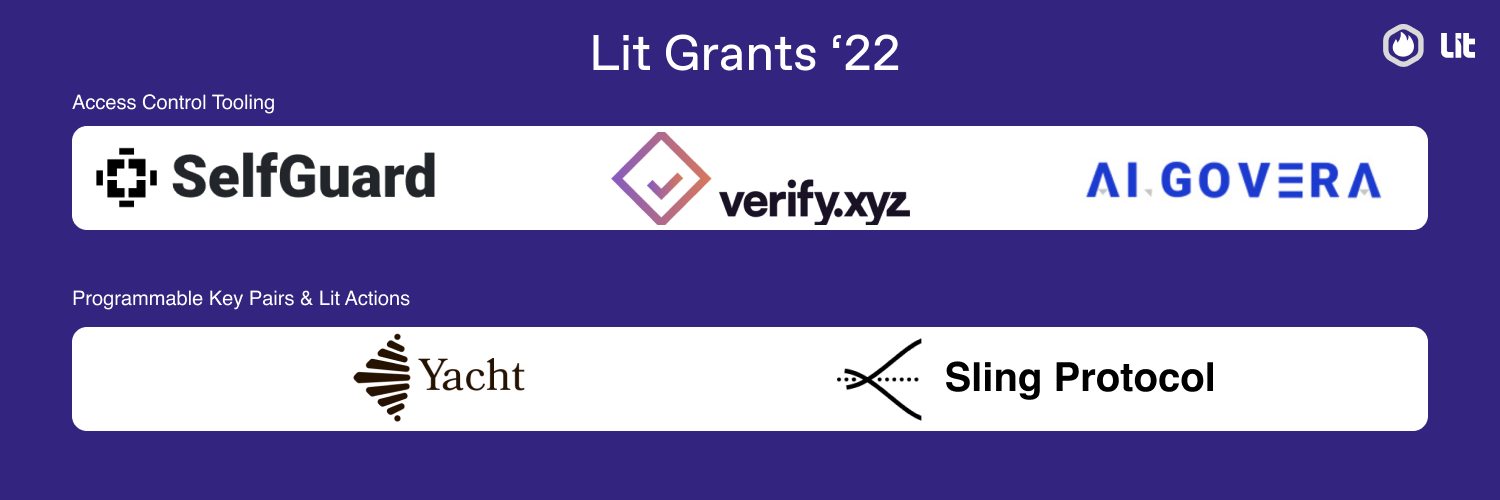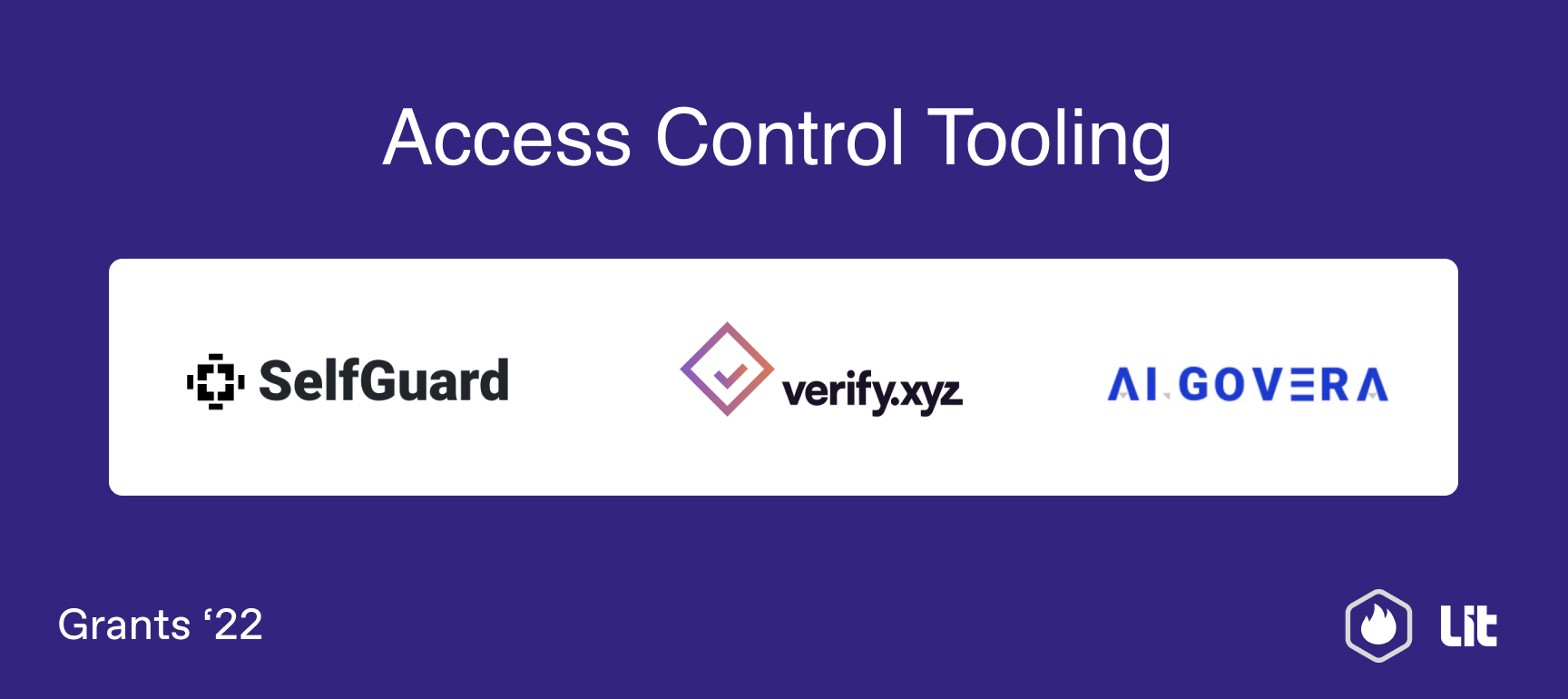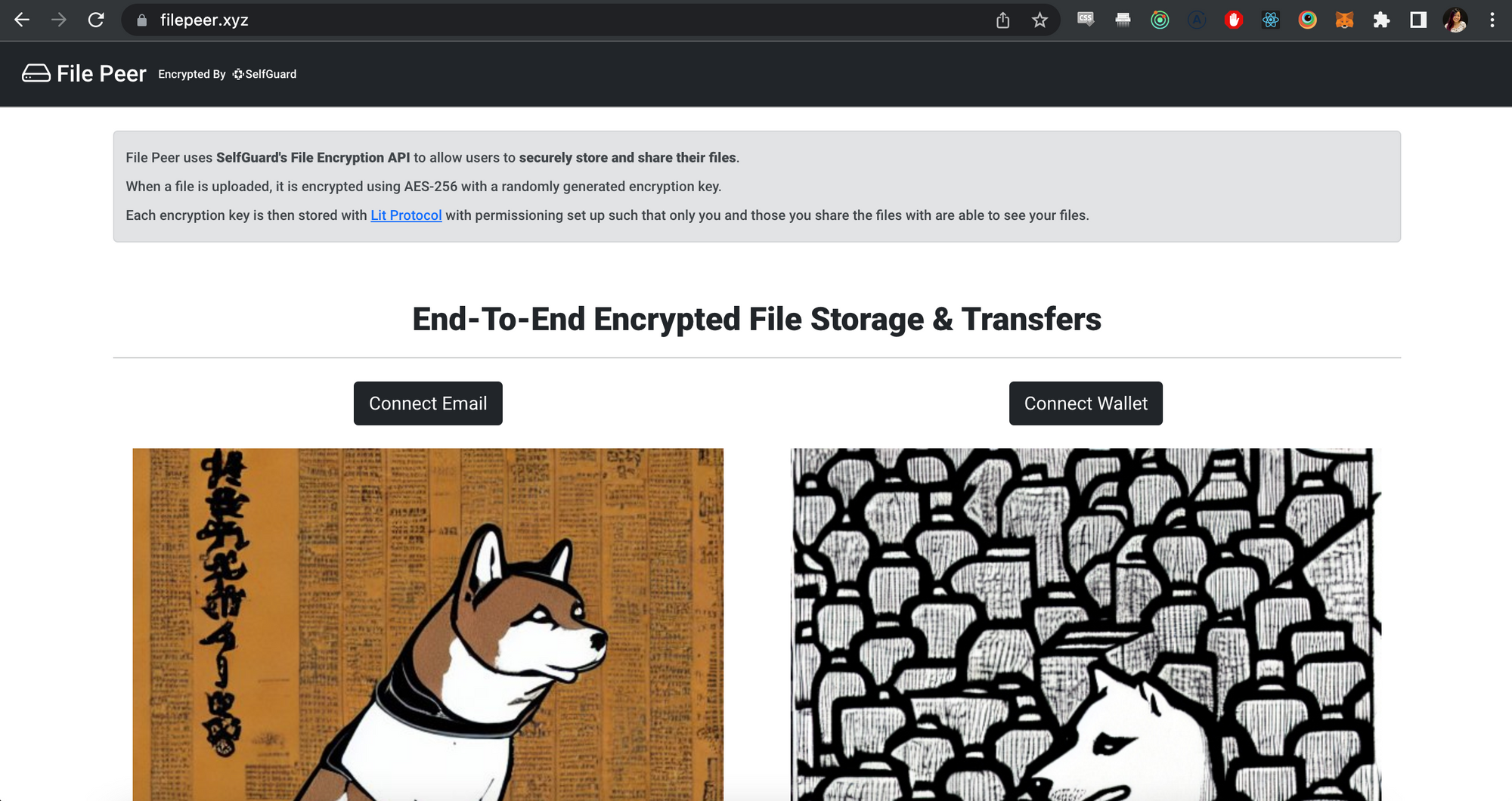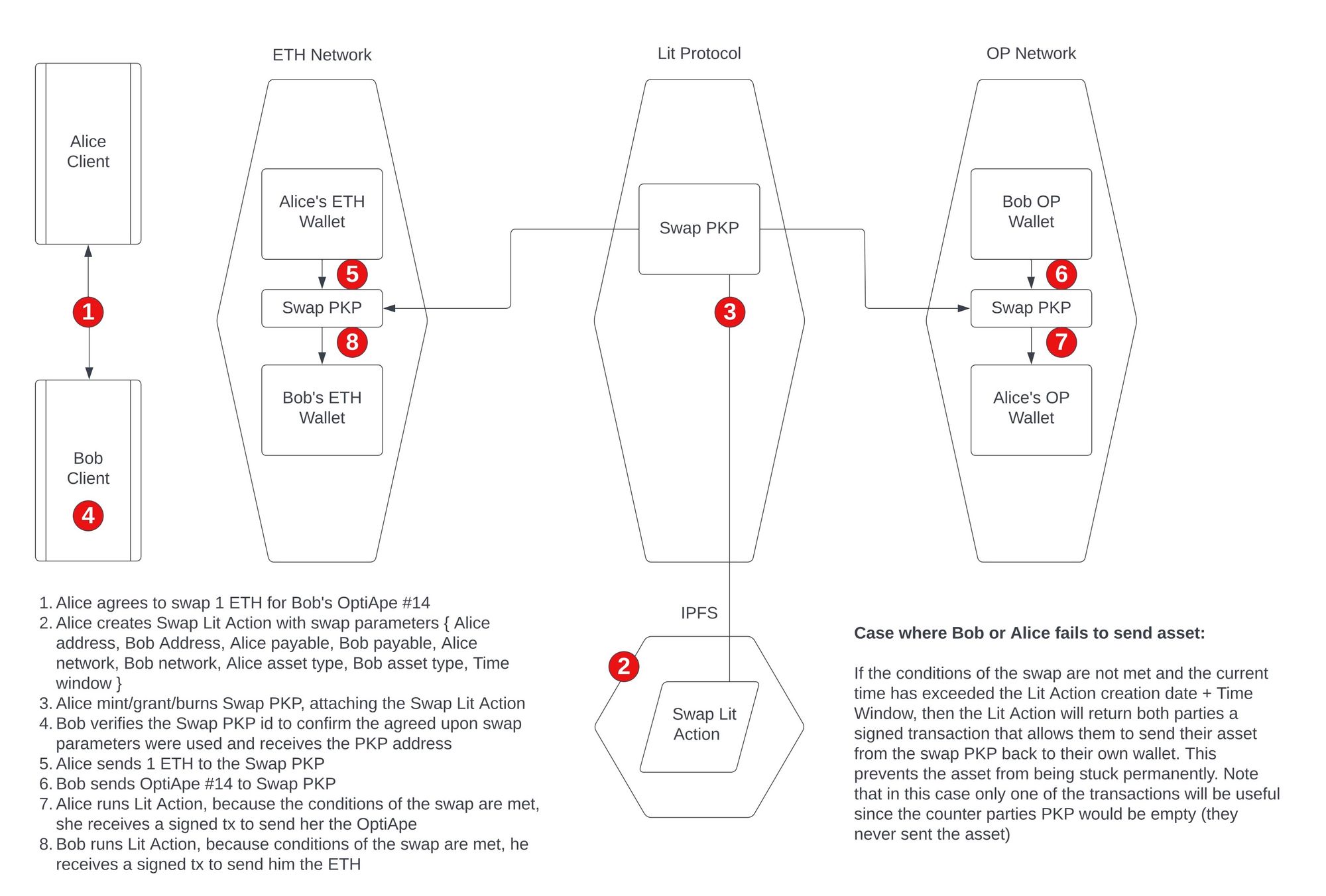Lit Grants '22 Round Up
As the year comes to a close, we would like to take a moment to reflect on the Lit grant program.

The grant program was established to support open source tooling and development with Lit's technology. We are thrilled to have had the opportunity to review and support a range of projects that have made significant contributions to the growing the ecosystem!
In this review, we will highlight some of the projects that have received grants, as well as discuss the impact on what’s possible with decentralized technology. We hope that this review will inspire others to apply to the grant program in the future, and we look forward to seeing the continued growth and development of the ecosystem.
Some highlights before we dive in: AlgoveraAI is working to to integrate Lit into Streamlit, an open source package for creating demos with machine learning models in Python. SelfGuard integrated Lit into its encrypted file storage module. Verify.xyz is developing decentralized profiles in social media using DIDs with smart contracts and Lit to provide a method for self-governing and presenting verifiable data in a decentralized system. Finally, Yacht Labs is developing a cross-chain asset swap using the Lit, which will enable users to safely swap assets across blockchains and solve liquidity fragmentation and counter-party risk issues.
Grants Process
The Lit team accepts grants through GitHub Issues, check out the grants repository to learn more on how to submit a proposal. All grants that have gone through the review process are viewable on GitHub - the team is committed to working as openly and transparent as possible!
The criteria for selection is on open source tooling that extends the use case of Lit. The grant program started with a focus on access control tooling. As the programmatic signing product becomes more mature, the grant program will be focused on funding projects using Programmable Key Pairs and Lit Actions.
Access Control

With Lit Protocol, you can set on-chain conditions like "user must hold an NFT" and then the network will provision signatures and decryption keys for users that meet those conditions. Learn more about access control.
The grants program supported open source tooling to extend the access control use cases for Lit, adding additional usability to Lit’s JavaScript SDK.
AlgoveraAI
Grant application: https://github.com/LIT-Protocol/LitGrants/issues/14
GitHub Repository: https://github.com/AlgoveraAI/streamlit-metamask
Docs: https://docs.algovera.ai/docs/Developer/streamlit
Try out the demo application: streamlit-lit-nft
Video tutorial:
Brief:
This project aims to integrate Lit Protocol in reusable Streamlit components. Streamlit is an open source package for creating demos with machine learning models in Python. The Lit integration will extend the use case for the SDK on an existing projects adding Web3 components to Streamlit, allowing data scientists to monetize their machine learning models and creators to quickly build token-gated applications.
Lit is used as the access control layer to various content displayed in Streamlit apps. This integration will add a number of Python components that developers can use to build token/NFT/wallet-gated applications. The project will import Lit on the server-side of Streamlit which is abstracted away for the end user.
SelfGuard.xyz

Grant application: https://github.com/LIT-Protocol/LitGrants/issues/12
GitHub Repository: https://github.com/selfguard/selfguard
Docs: https://docs.selfguard.xyz/introduction
Brief:
SelfGuard uses encryption infrastructure to provide developers tools to build better and more secure UI/UX for their users. Some of these tools include Encrypted Notifications & Encrypted File Storage.
This will ensure that users who use the encrypted file storage module with Metamask will have their underlying encryption keys stored with Lit Protocol, the files stored on IPFS (and backed up), and the associations of the files to the encryption keys stored with SelfGuard.
The underlying SDK of the encryption and file storage APIs will be open sourced, but the backend storage of the associations of files to keys, will remain with SelfGuard. SelfGuard also uses Lit to handle the storage of the encryption keys.
Check out the application: File Peer - Encrypted By SelfGuard
Verify.xyz
Grant application: https://github.com/LIT-Protocol/LitGrants/issues/21
GitHub Repository: GitHub - verify-xyz/did-profiles at poc-lit
Brief:
Verify XYZ is developing the essential building blocks for decentralized profiles in social media. We are combining pre-existing DID smart contracts with Lit protocol to provide a method for self-governing and presenting verifiable data in a decentralized system.
Meta transactions will be leveraged on the smart contract to simplify the experience for the user and keep the client simple. These transactions are fee-less for the user and the server can handle the complex smart-contract interactions.
Lit Protocol is being used to show how a user could control access to their profile content. The overall plan for the system design can be seen in the schematic.

During the did-publish phase, user content will be encrypted with access conditions bound to the blockchain state of the ethr-did-registry smart contract. During the did-resolve phase, the same content is decrypted honoring the state managed by the user. The user will have binary control over whether their profile remains public or private.
Lit Actions & Programmable Key Pairs

Lit Actions are immutable JavaScript programs that can be stored on IPFS. They can be signed through public and private key-pairs called Programmable Key Pairs. Lit actions can make arbitrary HTTP requests and use the data in their computation. This opens up a new realm of possibilities for smart contracts, as they can now access data from external sources such as HTTP endpoints, blockchains, state machines, and decentralized storage systems. Sling Protocol and Yacht Labs are two teams pushing forward what’s possible with this new technology.
Sling Protocol
Grant application: https://github.com/LIT-Protocol/LitGrants/issues/4
GitHub Repository: https://github.com/Sling-Protocol/pkp-dex-sdk
Brief:
Sling Protocol is building a decentralized and user-friendly automation network. In the long term, Sling envisions a protocol layer that users, developers, and enterprises can use to automate any on-chain action and compose these automations into complex transactional state machines. This is infrastructure for making highly composable and flexible new primitives.
The Sling Protocol team has built an SDK to make swapping ERC-20 tokens easy with Lit Actions and PKPs. Sling Protocol is composed of two elements: a secure, decentralized orderbook, and a competitive network of executors. The SDK can be used to create programmable orders, which will be executed upon certain condition(s) being met. Once the order object has been created, it will be encrypted and submitted to the orderbook. Access control conditions and a symmetric key will be submitted to Lit. When an executor verifies that an order’s condition has been met, its order data is decrypted using Lit and the executor may execute the order on chain, receiving a reward left by the user that placed the order.
Yacht Labs
Grant application: https://github.com/LIT-Protocol/LitGrants/issues/18
GitHub Repository: https://github.com/Yacht-Labs/yacht-lit-sdk
Brief:
Yacht Labs proposed a novel cross-chain swapping solution that will utilize Lit as a cross-chain messaging layer, enabling users to trustlessly swap their assets across different Lit-enabled blockchain protocols. Users will receive actual assets, not synthetic ones, on the destination side of the swap. The solution uses PKPs with immutable Lit Actions to act as a decentralized messaging agent that will securely execute the swap. This scheme will provide enhanced security over centralized bridges: there is no honeypot of pooled liquidity and much less potential for a bad internal actor to rug funds from the pool.
The proposed project aims to create a modular software development kit that will enable developers to easily implement cross-chain swaps of ERC20 tokens. These swaps would allow users to safely transfer assets between different blockchain networks, solving issues of liquidity fragmentation and counterparty risk. Swaps will also be faster, taking only a few minutes instead of the week-long lead times of some optimistic bridges. It will initially be designed to work on EVM-compatible networks, but could potentially be extended to work on other networks like Bitcoin, Cosmos, and Solana. The SDK will also have the ability to facilitate swaps of other types of assets, such as non-fungible tokens (NFTs) and native assets, as well as support arbitrary message signing.
Below is an architecture diagram that describes the swap process.

Conclusion
Lit is excited about the projects that have already come through the program! We would like to express our deep appreciation for the hard work and dedication of all the grant recipients. Lit is grateful for their passion and commitment to open source tooling and development, and we look forward to seeing the continued success of these projects.
We would also like to thank the entire Lit community for your support and engagement throughout the year. We are excited to see what the future holds for the Lit ecosystem, and we hope that this grant program has helped to pave the way for even more innovation and progress.
If you have an idea for a project extending Lit, we encourage you to submit a proposal to the grants program. If you want some ideas of what to build check out the Ecosystem Request for Proposals. Let’s work together to free the web!
